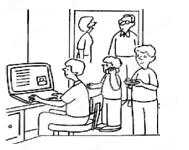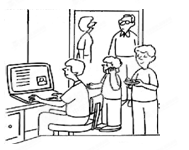
題目列表(包括答案和解析)

| A.2. | B.3. | C.4. | D.5. |
| A.students could be put into unreal situations on the Internet |
| B.teenagers are facing unknown dangers on the social networks |
| C.Internet provides more social websites to American teenagers |
| D.social networks are very popular among teenagers in America |
| A.the dangers are similar when chatting online and surfing social networks |
| B.more than half American teenagers aged from 12 to 17 use social networks |
| C.teens who ask for help are wiser when meeting problems on social networks |
| D.there are more disadvantages than advantages for teens to use social networks |

| A.2. | B.3. | C.4. | D.5. |
| A.students could be put into unreal situations on the Internet |
| B.teenagers are facing unknown dangers on the social networks |
| C.Internet provides more social websites to American teenagers |
| D.social networks are very popular among teenagers in America |
| A.the dangers are similar when chatting online and surfing social networks |
| B.more than half American teenagers aged from 12 to 17 use social networks |
| C.teens who ask for help are wiser when meeting problems on social networks |
| D.there are more disadvantages than advantages for teens to use social networks |
Recent research from the Pew Internet Project suggests that 90% of Americans aged from 12 to 17 use the Internet, and 51% of those teens use social networks. However, there are many possible problems with social networking sites and the teenagers who use them. 
Apart from the social advantages, social networking sites can be used to record school research, develop artistic talents and experiment with other forms of subject creation. They provide a way to communicate with others who share the same interests and to get helpful advice on ongoing projects.
Along with these advantages come some dangers. For example, most social networking sites are open to all, especially MySpace, which is the most popular social network among teens in America. It means that they could be put in unpleasant and frightening situations.
A greater danger is that teens may become objects of the people with secret purposes. The secrecy of some social networking sites makes it easy for dangerous people to find young teens and invite them into dangerous conversations. It’s easy for them to pretend as teens and draw children into dangerous real-world communication as well. Then further hurt might be on its way.
Another danger is identity stealing, which can happen when teens share too much information about their names, dates of birth and locations.
Therefore, it’s very important to make sure teens are safe when they use social networks.
Many of the same rules that work for online chat work for these sites:
※Don’t use your real name.
※ Don’t give out personal information to people you don’t know. A last name and a town
are enough for a bad guy to find where you are.
※ Don’t believe that people are who they say to be.
※ Immediately end any communication that makes you uncomfortable and report it to a
parent.
Only if you are sure of your safety, can you enjoy the fun brought by social networking. Besides, trying to deal with all problems on your own can lead to terrible results. Remember, asking your parents or school officials for help doesn’t mean you are unable to do anything but wiser than many others.
【小題1】How many dangers of using social networks are mentioned in the passage?
| A.2. | B.3. | C.4. | D.5. |
| A.students could be put into unreal situations on the Internet |
| B.teenagers are facing unknown dangers on the social networks |
| C.Internet provides more social websites to American teenagers |
| D.social networks are very popular among teenagers in America |
| A.the dangers are similar when chatting online and surfing social networks |
| B.more than half American teenagers aged from 12 to 17 use social networks |
| C.teens who ask for help are wiser when meeting problems on social networks |
| D.there are more disadvantages than advantages for teens to use social networks |

Recent research from the Pew Internet Project suggests that 90% of Americans aged from 12 to 17 use the Internet, and 51% of those teens use social networks. However, there are many possible problems with social networking sites and the teenagers who use them.
Apart from the social advantages, social networking sites can be used to record school research, develop artistic talents and experiment with other forms of subject creation. They provide a way to communicate with others who share the same interests and to get helpful advice on ongoing projects.
Along with these advantages come some dangers. For example, most social networking sites are open to all, especially MySpace, which is the most popular social network among teens in America. It means that they could be put in unpleasant and frightening situations.
A greater danger is that teens may become objects of the people with secret purposes. The secrecy of some social networking sites makes it easy for dangerous people to find young teens and invite them into dangerous conversations. It’s easy for them to pretend as teens and draw children into dangerous real-world communication as well. Then further hurt might be on its way.
Another danger is identity stealing, which can happen when teens share too much information about their names, dates of birth and locations.
Therefore, it’s very important to make sure teens are safe when they use social networks.
Many of the same rules that work for online chat work for these sites:
※ Don’t use your real name.
※ Don’t give out personal information to people you don’t know. A last name and a town are enough for a bad guy to find where you are.
※ Don’t believe that people are who they say to be.
※ Immediately end any communication that makes you uncomfortable and report it to a parent.
Only if you are sure of your safety, can you enjoy the fun brought by social networking. Besides, trying to deal with all problems on your own can lead to terrible results. Remember, asking your parents or school officials for help doesn’t mean you are unable to do anything but wiser than many others.
【小題1】How many dangers of using social networks are mentioned in the passage?
| A.2. | B.3. | C.4. | D.5. |
| A.students could be put into unreal situations on the Internet |
| B.teenagers are facing unknown dangers on the social networks |
| C.Internet provides more social websites to American teenagers |
| D.social networks are very popular among teenagers in America |
| A.the dangers are similar when chatting online and surfing social networks |
| B.more than half American teenagers aged from 12 to 17 use social networks |
| C.teens who ask for help are wiser when meeting problems on social networks |
| D.there are more disadvantages than advantages for teens to use social networks |

| A.2. | B.3. | C.4. | D.5. |
| A.students could be put into unreal situations on the Internet |
| B.teenagers are facing unknown dangers on the social networks |
| C.Internet provides more social websites to American teenagers |
| D.social networks are very popular among teenagers in America |
| A.the dangers are similar when chatting online and surfing social networks |
| B.more than half American teenagers aged from 12 to 17 use social networks |
| C.teens who ask for help are wiser when meeting problems on social networks |
| D.there are more disadvantages than advantages for teens to use social networks |
湖北省互聯(lián)網(wǎng)違法和不良信息舉報平臺 | 網(wǎng)上有害信息舉報專區(qū) | 電信詐騙舉報專區(qū) | 涉歷史虛無主義有害信息舉報專區(qū) | 涉企侵權舉報專區(qū)
違法和不良信息舉報電話:027-86699610 舉報郵箱:58377363@163.com